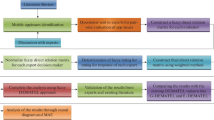Abstract
As the dependence on mobile devices increases, the need for supporting a wider range of users and devices becomes crucial. Elders and people with disabilities adopt new technologies reluctantly, a tendency caused by the lack of adaptation of these technologies to their needs. To address this challenge, this paper describes a framework, Imhotep, whose aim is to aid developers in the accessible application creation process, making the creation of user-centered applications easier and faster. Our framework allows to easily adapt the applications to the constraints imposed by the user capabilities (sensorial, cognitive, and physical capabilities) and device capabilities by providing a repository that will manage the compilation and deployment of applications that include a set of preprocessor directives in the source code. These directives are enhanced with concepts that are automatically adjusted to the current trends of mobile devices by using a Fuzzy Knowledge-Eliciting Reasoner. Our final goal is to increase the number of applications targeted to elders and people with disabilities providing tools that facilitate their development. The paper also describes the evaluation of both the accuracy of the fuzzy terms generated for mobile devices and the usability of the proposed platform.













Similar content being viewed by others
Notes
OpenLaszlo. http://www.openlaszlo.org
Google Web Toolkit. code.google.com/webtoolkit
Antenna. antenna.sourceforge.net
J2ME Polish. http://www.j2mepolish.org
PIRAmIDE: Personalizable Interactions with Resources on AMI-Enabled Mobile Dynamic Environments. http://www.piramidepse.com
WURFL (Wireless Universal Resource File). http://wurfl.sourceforge.net
Google Trends. http://www.google.es/trends
References
Kaye HS (2000) Computer and internet use among people with disabilities. In: Disability statistics report 2000. Department of Education, National Institute of Disability and Rehabilitation Research, Washington, DC
Walker A (1999) Ageing in Europe—challenges and consequences. Zeitschrift für Gerontologie und Geriatrie (Springer Berlin/Heidelberg) 32(6)
Ambient Assisted Living Joint Programme (2010) http://www.aal-europe.eu
Ahn H-I, Lee J-E, Yoon Y-I (2007) A middleware for user centric adaptation based on fuzzy in ubiquitous environment. Sixth international conference on advanced language processing and web information technology
Abe M, Morinishi Y, Maeda A, Aoki M, Inagaki H (2009) Coool: a life log collector integrated with a remote-controller for enabling user centric services. Digest of Technical Papers International Conference on Consumer Electronics
Al Masum SM , Prendinger HT, Ishizuka M (2007) Emotion sensitive news agent: an approach towards user centric emotion sensing from the news. IEEE/WIC/ACM international conference on web intelligence
Hagen S, Sandnes F (2010) Toward accessible self-service kiosks through intelligent user interfaces. Pers Ubiquitous Comput 14(1):1–7
Hervás R, Bravo J, Fontecha J (2010) A context model based on ontological languages: a proposal for information visualization. J Univers Comput Sci (JUCS) 16(12):1539–1555
de Ipiña DL, Vázquez JI, García D, Fernández J, García I, Sainz D, Almeida A (2006) EMI2lets: a reflective framework for enabling AmI. J Univers Comput Sci (JUCS) 12(3):297–314
Acknowledgments
This work has been supported by project grant TSI-020301-2008-2 (PIRAmIDE), funded by the Spanish Ministry of Industry, Tourism and Trade.
Author information
Authors and Affiliations
Corresponding author
Rights and permissions
About this article
Cite this article
Almeida, A., Orduña, P., Castillejo, E. et al. Imhotep: an approach to user and device conscious mobile applications. Pers Ubiquit Comput 15, 419–429 (2011). https://doi.org/10.1007/s00779-010-0359-8
Received:
Accepted:
Published:
Issue Date:
DOI: https://doi.org/10.1007/s00779-010-0359-8




